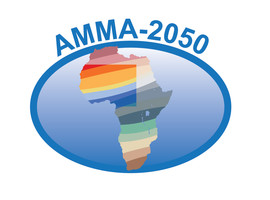AMMA 2050: African Monsoon Multidisciplinary Analysis 2050

About
The climate of West Africa is subject to some of the most variable rainfall patterns seen anywhere in the world. In the past the area has been hit by periods of prolonged and severe droughts which have had strong consequences on the livelihoods of many people. These populations are growing and are increasingly vulnerable to changes in the climate trends, particularly on the short to medium term. By combining West African skills and knowledge of the needs of urban planners and agricultural sector with expertise from the UK and France the AMMA-2050 team aim to improve understanding of the variability of future climate.
The AMMA-2050 team will investigate how physical processes interact to cause ‘high impact weather events’ such as storms and heat waves that affect lives and livelihoods. Not only will they look at how the total amount of rainfall is likely to change – but also at how rainfall is likely to be distributed throughout the wet season. For example, heavy rainfall concentrated in just a few hours places great stress on human settlements, infrastructure and agriculture. By applying expert judgement, they will identify adaptation options in water resources and agriculture.
Read about related projects here:
- IMPALA: Improving Model Processes For African Climate
- HyCRISTAL: Integrating Hydro-Climate Science Into Policy Decisions For Climate-Resilient Infrastructure and Livelihoods in East Africa
AMMA-2050 is part of the Future Climate For Africa programme, running from 2015 to 2019.
Objectives and Approach
The AMMA-2050 project aims to improve understanding of how the West African monsoon will be affected by climate change in the coming decades – and help West African societies prepare and adapt.
This initiative combines observations and climate models with new, cutting edge methods to assess how the West African climate is likely to change over the coming decades. It builds on the largest multi-disciplinary research effort ever undertaken on Africa’s climate and environment, the African Monsoon Multi-disciplinary Analysis (AMMA, 2003–present).
The AMMA-2050 team will work with decision makers and affected groups to jointly develop tools and approaches which can support them in using improved climate information.
Key sectors
The two sectors that are particularly relevant to livelihoods are urban planning (a key concern due to the growing populations of cities) and agricultural cultivation schemes (where large sections of the population still depend on subsistence farming).
In addition to assessing how these sectors will be impacted at a regional level we will also conduct two focus studies to determine in depth:
- how urban planners use information on flooding to make their plans.
- what crops traits/varieties are needed in a future climate.
The aim is for both urban and agricultural actors to have improved tools that aid them in designing strategies that are robust for a future climate.
The research and capacity building work AMMA-2050 will undertake in partnership with African, UK and French partners will result in a workforce able to lead decisions that are relevant to West African nations. Therefore the team’s proposed work is designed with excellent science at its core but will work with social scientists to aid in understanding how best to make use of the project outcomes. Furthermore end-users have an important role as their needs are included in the design of the project making sure the results coming out of the project are in a format that is easily used by them.
Improved resilience is an important aim for AMMA-2050 and it starts with improving our understanding of the climate signal over the West African region and leading through to how decisions are taken in very specific pilot studies that showcase the importance of having access to improved science outputs.
Partners
- Centre for Ecology and Hydrology (UK)
- National Agency for Civil Aviation and Meteorology (Senegal)
- Félix Houphouët- Boigny University (Ivory Coast)
- University of Cape Coast (Ghana)
- Senegalese Institute for Agricultural Research
- VNG Consulting Limited & Fellow at Kings College London (UK)
- University of Leeds (UK)
- Met Office (UK)
- University of Sussex (UK)
- Institute for Development Research – Hydrology and Environment (France)
- Pierre Simon Laplace Institute – Oceanic and Climate Laboratory (France)
- French Agricultural Research Centre for International Development (France)
- National Centre for Meteorological Research – the Meteorological Atmosphere Study Group (France)
Funding
AMMA 2050 is one of the five research consortia which form the Future Climate for Africa (FCFA) Programme, jointly funded by the UK Department for International Development and the UK Natural Environment Research Council.
Some of this text was take from a description of the AMMA-2050 project for the Centre for Ecology and Hydrology by Dr. Tanya Wamaars; the full text can be viewed at https://www.ceh.ac.uk/our-science/projects/african-monsoon-multi-disciplinary-analysis-2050
Related resources
- Go to the AMMA 2050 Project Website
- Read the FCFA report "Africa's Climate: Helping decision-makers make sense of climate information"
- Find more resources and videos on the Future Climate for Africa website
- Read about the FCFA IMPALA project - Improving Model Processes For African Climate
- Read about the FCFA UMFULA project - Uncertainty reduction in models for understanding development applications
- Read about the FCFA FRACTAL project - Future Resilience for African Cities and Lands
- Read about the FCFA HyCRISTAL project - Integrating Hydro-Climate Science Into Policy Decisions For Climate-Resilient...
(0) Comments
There is no content